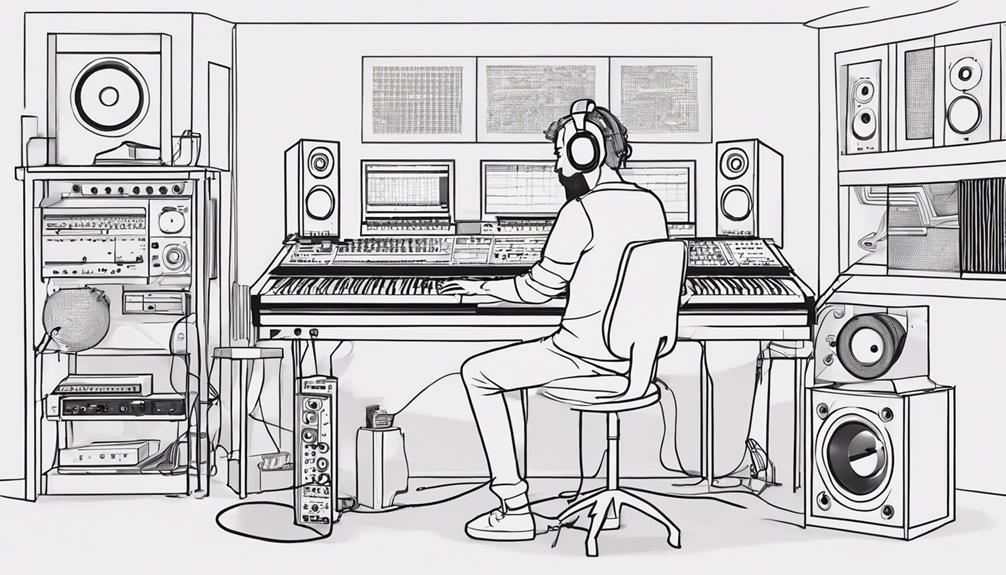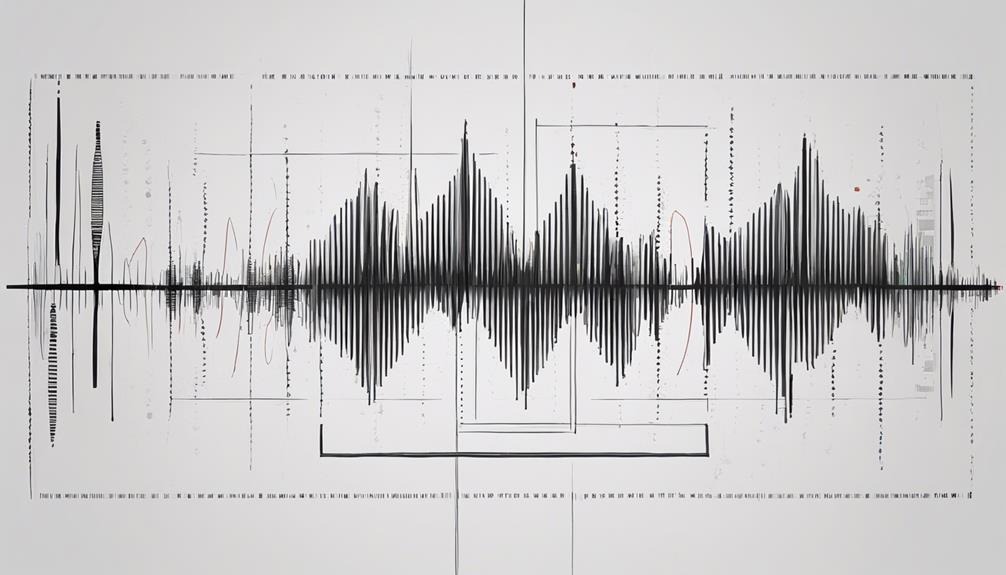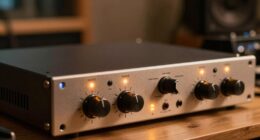To enhance your music production skills, mastering music theory is crucial. Immerse yourself in online courses on Coursera, Udemy, or Skillshare for specialized lessons. Experiment with interactive tools like MusicTheory.net for engaging learning. Take advantage of free resources like Ableton's Learning Music (Beta) to cover production basics. Hone your ears with programs like Good Ear for improved musical structure recognition. Perfect pitch recognition and chord identification through ear training exercises. Major chords bring brightness, while minor chords evoke deeper emotions. Extended chords like ninths expand your sound palette. Experiment with chord progressions to create impactful tracks. Delve deeper into the subject with resources from YouTube channels like '12tone'.
Key Takeaways
- Understand chords, scales, and keys for informed decisions.
- Take online courses and use tools for theory mastery.
- Practice ear training exercises for pitch and chord recognition.
- Analyze harmony and chord progressions for emotional impact.
- Utilize resources like books, websites, and software for learning.
Importance of Music Theory in Production
Understanding music theory is essential for producers to make informed musical decisions in their compositions. A solid understanding of music theory knowledge, including chord progressions, notes, scales, major and minor keys, and music notation, is vital when working with electronic music production.
Producers with a strong understanding of music theory can create harmonically pleasing tracks by utilizing creative techniques that leverage their knowledge of how different elements interact within a piece of music. This understanding allows producers to experiment confidently, communicate effectively with other musicians, and elevate the quality of their productions.
Essential Online Courses and Tools
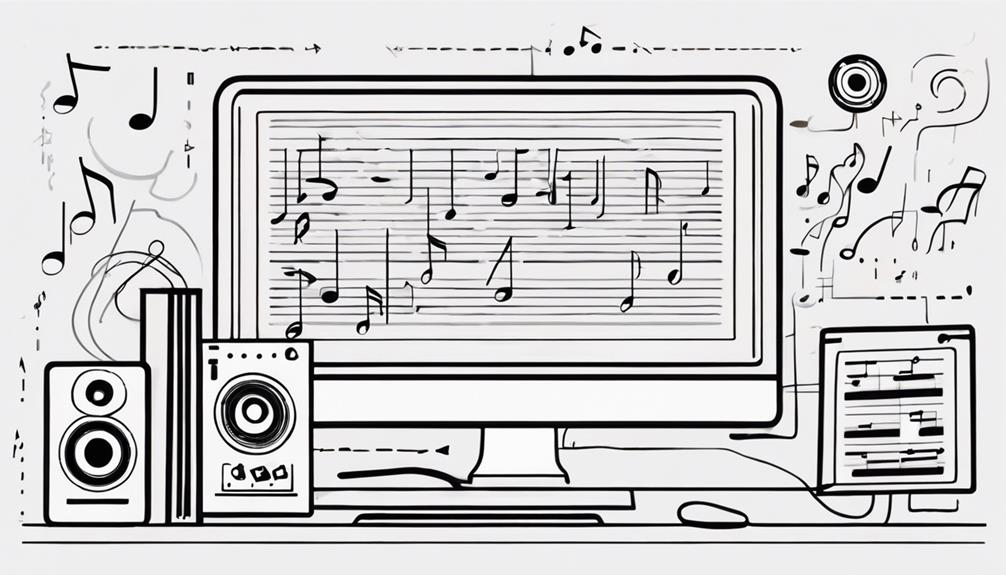
Explore various online courses and tools that can enhance your understanding of music theory for music production. When diving into the world of music theory online, consider the following options:
- Online Platforms: Platforms like Coursera, Udemy, and Skillshare offer specialized music theory courses tailored for music production, covering topics such as chords, scales, and modes.
- Interactive Tools: Websites like MusicTheory.net provide interactive tools that make learning music theory engaging and practical, helping you grasp the basic understanding of music theory concepts.
- Free Courses: Ableton's Learning Music (Beta) offers a free online course that covers the basics of music production and theory, accessible through a browser, focusing on DAWs and piano roll teaching.
- Ear Training Programs: Good Ear provides free online ear training programs important for improving your ability to identify musical structures, a skill essential for music producers and instrumentalists alike.
Utilize these resources to deepen your understanding of music theory and enhance your music production skills.
Practical Ear Training Exercises

To enhance your music production skills, start practicing practical ear training exercises to improve your pitch recognition and chord identification abilities. Begin by focusing on identifying intervals by ear to deepen your understanding of pitch relationships.
Train your ear to recognize different chord qualities such as major, minor, augmented, and diminished, which will help you create harmonically rich music compositions. Pay attention to various chord progressions in popular songs across genres to develop a keen sense of chord movement and structure.
Engage in dictation exercises to transcribe melodies and chord progressions solely by ear, enhancing your ability to translate musical ideas directly into your productions. Utilize online ear training tools like Good Ear to refine your aptitude in recognizing musical structures accurately and efficiently.
In-Depth Analysis of Harmony and Chords

What role do harmony and chords play in shaping the overall sound and emotional impact of a music composition?
Harmony and chords are fundamental elements in music production, influencing the mood and atmosphere of a piece greatly. Here's a deeper look at how chords interact and contribute to the harmonic structure of a composition:
- Major and Minor Chords: Major chords often create a bright and uplifting feel, while minor chords tend to evoke more somber or melancholic emotions.
- Seventh Chords: Adding seventh notes to chords can introduce tension and complexity, enhancing the emotional depth of the music.
- Extended Chords: Extended chords, like ninth or eleventh chords, provide a lush and sophisticated sound, perfect for creating a rich harmonic palette.
- Chord Progressions: The sequence in which chords are played, often involving the movement from the root note to the third note to the fourth note, is vital in establishing the overall harmonic structure and emotional journey of a musical piece. Understanding and manipulating chord progressions can greatly impact the listener's experience.
Further Resources for Music Theory
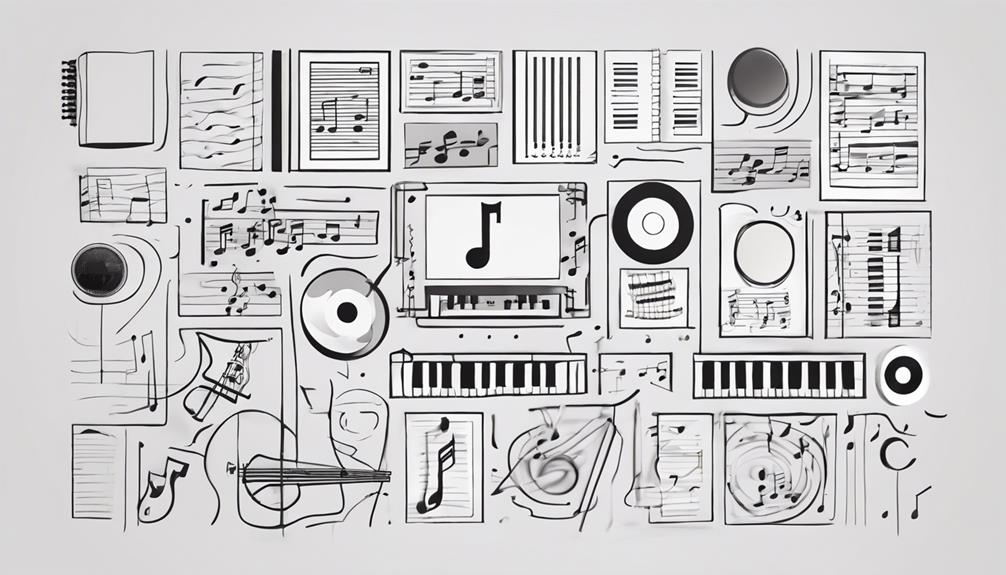
Various resources are available to deepen your understanding of music theory in the context of music production. Whether you are looking to learn the basics or dive into more advanced concepts, there are online platforms, interactive tools, and practical applications that can help you enhance your music theory knowledge. Consider enrolling in music theory courses on platforms like Coursera, Udemy, or Skillshare to receive structured learning tailored for music producers. Websites such as MusicTheory.net offer interactive tools and exercises to reinforce your understanding of music theory concepts. Books like 'Music Theory for Computer Musicians' by Michael Hewitt provide valuable insights into applying music theory in music production. Additionally, YouTube channels like '12tone' and 'Rick Beato' offer engaging lessons on music theory concepts relevant to music production. Don't forget to explore the built-in tools and features in music production software that allow for direct application of music theory principles in your music creation process.
| Resource | Description |
|---|---|
| Online resources | Platforms like Coursera, Udemy, and Skillshare offer music theory courses. |
| Interactive tools | Websites like MusicTheory.net provide tools and exercises for practice. |
| YouTube channels | Channels like '12tone' and 'Rick Beato' offer engaging music theory lessons. |
| Music production software | Software includes tools for applying music theory in music creation. |
Frequently Asked Questions
Do You Need to Learn Music Theory for Music Production?
You need to learn music theory for music production. It enhances skills, aids in decision-making, provides a foundation for composing, helps in communication, and sets you apart in the industry. It's essential for your growth and success.
How Much Music Theory Do I Need for Music Production?
You only need as much music theory for production as spices for a flavorful dish. Master scales, chords, and rhythm basics; sprinkle in advanced concepts for depth. Blend theory with creativity to craft engaging tracks.
What Are the Most Important Things to Learn in Music Theory?
To master music theory, concentrate on understanding scales, chords, and intervals for a strong foundation. Immerse yourself in chord progressions, harmony, rhythm, and melody for composition depth. Explore advanced concepts like seventh chords and counterpoint for complexity and creativity.
How Do I Teach Myself Music Production?
To teach yourself music production, begin by delving into online resources like Ableton's Learning Music for basics. Immerse yourself in Soundfly's Theory for Producers course. Enhance ear training with Good Ear's program. Engage with Lightnote's course for DAW-focused theory. Read The Splice Blog for insights. Experiment with free or budget-friendly digital audio workstations (DAWs) like GarageBand or FL Studio to get hands-on practice. Join online communities and forums where beginners share tips, ask questions, and collaborate on projects to make music production for beginners more accessible and enjoyable. Above all, stay patient and consistent, as developing production skills is an ongoing process.
Conclusion
Now that you've learned about the importance of music theory in production and explored essential online courses and tools, you're well on your way to mastering the art of music production.
Did you know that a study found that musicians with formal music training have larger and more connected brain regions involved in processing music and language?
Keep practicing your ear training and analyzing harmony and chords to continue improving your skills!




